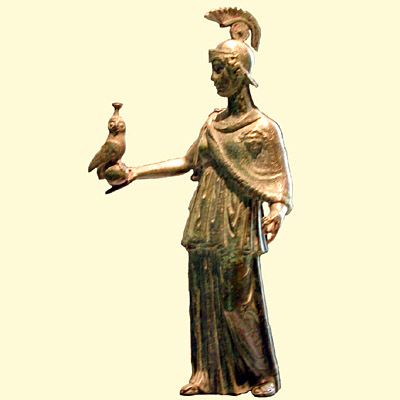
Minerva (Athena) the Roman goddess of wisdom.
I wondered why Min, the founder of Egypt, and Minerva have similar names.
Where does the Latin word Minerva come from?
From the Greek μνῆστις meaning memory, remembrance, or recollection.
"There is no teaching, but only recollection." -- Plato, philosopher, 380 B.C.
And where did Athena come from?
From the city of Sais, the sacred site built upon the "Great Pit" meteorite impact crater in Sa el Hagar, Egypt.
"Furthermore, the Egyptians (they said) first used the names of twelve gods (which the Greeks afterwards borrowed from them); and it was they who first assigned to the several gods their altars and images and temples, and first carved figures on stone. Most of this they showed me in fact to be the case. The first human king of Egypt, they said, was Min." -- Herodotos, historian, Book II, ~440-420 B.C.
"She [Minerva] founded your city a thousand years before ours, receiving from the Earth and Hephaestus the seed of your race, and afterwards she founded ours, of which the constitution is recorded in our sacred registers to be eight thousand years old." -- Sonchis of Sais, priest, ~594 B.C.
"Afterwards, when most of the inhabitants of Greece were destroyed by flood, and all records and ancient monuments perished with them, the Egyptians took this occasion to appropriate the study of astrology solely to themselves; and whereas the Grecians (through ignorance) as yet valued not learning, it became a general opinion that the Egyptians were the first that found out the knowledge of the stars." -- Diodoros, historian, ~1st century B.C.
"And so even to the Athenians themselves, though they built the city of Sais in Egypt, yet by reason of the flood, were led into the same error of forgetting what was before." -- Diodoros, historian, ~1st century B.C.
Typical western chauvinism! Where did the Egyptians come from? Their Delta could only be 12000 years old given the deluge. They may have had a more extensive, now sunken, civilization before this. But the likeliest source is India. Where there is a pillar of iron that does not rust. Etc. The trade across what we call the Arabian Sea between the two areas is well known in modern times and was probably more intense earlier.
ReplyDeleteThe Vedas would have recorded the arrival of Venus as a planet?
"Where did the Egyptians come from?"
ReplyDeleteAntarctica in my opinion.
"They may have had a more extensive, now sunken, civilization before this."
The evidence overwhelms me.
"The Vedas would have recorded the arrival of Venus as a planet?"
"In an ancient Hindu tablet of planets, attributed to the year -3012 Venus among the visible planets is absent [Delambre, J.B.J., Histoire de l'astronomie ancienne I, Page 407, 1817: 'Venus alone is not found there.']." -- Immanuel Velikovsky, cosmologist, 1950
"These four-planet systems and the inability of the ancient Hindus and Babylonians to see Venus in the sky, even though it is more conspicuous than the other planets, are puzzling unless Venus was not among the planets." -- Immanuel Velikovsky, cosmologist, 1950